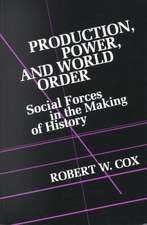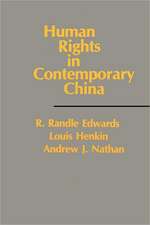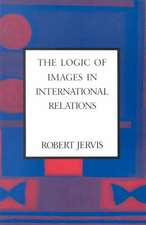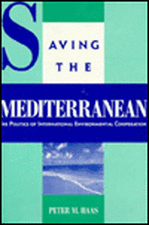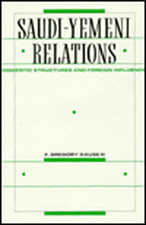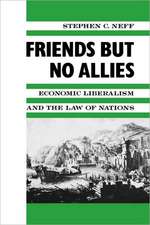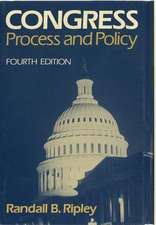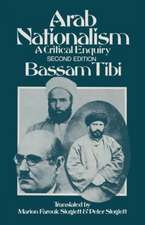Human Rights: Key Concepts
Autor Michael Freemanen Limba Engleză Paperback – 25 mai 2017
| Toate formatele și edițiile | Preț | Express |
|---|---|---|
| Paperback (1) | 217.36 lei 6-8 săpt. | |
| Polity Press – 25 mai 2017 | 217.36 lei 6-8 săpt. | |
| Hardback (3) | 431.64 lei 6-8 săpt. | |
| Polity Press – 25 mai 2017 | 431.64 lei 6-8 săpt. | |
| Polity Press – 21 feb 2011 | 489.80 lei 6-8 săpt. | |
| BLACKWELL PUBL – 9 oct 2002 | 513.29 lei 6-8 săpt. |
Din seria Key Concepts
-
 Preț: 127.37 lei
Preț: 127.37 lei -
 Preț: 134.77 lei
Preț: 134.77 lei -
 Preț: 220.23 lei
Preț: 220.23 lei -
 Preț: 275.18 lei
Preț: 275.18 lei -
 Preț: 276.56 lei
Preț: 276.56 lei -
 Preț: 127.55 lei
Preț: 127.55 lei -
 Preț: 190.29 lei
Preț: 190.29 lei -
 Preț: 144.81 lei
Preț: 144.81 lei -
 Preț: 238.08 lei
Preț: 238.08 lei -
 Preț: 213.97 lei
Preț: 213.97 lei -
 Preț: 135.65 lei
Preț: 135.65 lei -
 Preț: 275.18 lei
Preț: 275.18 lei - 5%
 Preț: 120.75 lei
Preț: 120.75 lei -
 Preț: 101.00 lei
Preț: 101.00 lei -
 Preț: 275.47 lei
Preț: 275.47 lei -
 Preț: 131.88 lei
Preț: 131.88 lei -
 Preț: 214.23 lei
Preț: 214.23 lei -
 Preț: 143.51 lei
Preț: 143.51 lei -
 Preț: 275.74 lei
Preț: 275.74 lei -
 Preț: 213.41 lei
Preț: 213.41 lei -
 Preț: 277.10 lei
Preț: 277.10 lei -
 Preț: 279.60 lei
Preț: 279.60 lei -
 Preț: 278.16 lei
Preț: 278.16 lei -
 Preț: 276.00 lei
Preț: 276.00 lei -
 Preț: 144.08 lei
Preț: 144.08 lei - 17%
 Preț: 214.78 lei
Preț: 214.78 lei -
 Preț: 127.55 lei
Preț: 127.55 lei -
 Preț: 143.67 lei
Preț: 143.67 lei -
 Preț: 143.42 lei
Preț: 143.42 lei - 19%
 Preț: 174.07 lei
Preț: 174.07 lei -
 Preț: 275.18 lei
Preț: 275.18 lei -
 Preț: 127.10 lei
Preț: 127.10 lei -
 Preț: 218.74 lei
Preț: 218.74 lei - 15%
 Preț: 427.25 lei
Preț: 427.25 lei -
 Preț: 218.00 lei
Preț: 218.00 lei -
 Preț: 219.09 lei
Preț: 219.09 lei - 16%
 Preț: 217.35 lei
Preț: 217.35 lei -
 Preț: 182.29 lei
Preț: 182.29 lei -
 Preț: 198.05 lei
Preț: 198.05 lei - 21%
 Preț: 216.79 lei
Preț: 216.79 lei - 23%
 Preț: 190.50 lei
Preț: 190.50 lei - 15%
 Preț: 429.51 lei
Preț: 429.51 lei - 21%
 Preț: 218.47 lei
Preț: 218.47 lei -
 Preț: 199.44 lei
Preț: 199.44 lei
Preț: 217.36 lei
Nou
Puncte Express: 326
Preț estimativ în valută:
41.60€ • 43.26$ • 34.81£
41.60€ • 43.26$ • 34.81£
Carte tipărită la comandă
Livrare economică 15-29 martie
Preluare comenzi: 021 569.72.76
Specificații
ISBN-13: 9781509510283
ISBN-10: 1509510281
Pagini: 288
Dimensiuni: 140 x 216 x 22 mm
Greutate: 0.34 kg
Ediția:3rd Edition
Editura: Polity Press
Seria Key Concepts
Locul publicării:Chichester, United Kingdom
ISBN-10: 1509510281
Pagini: 288
Dimensiuni: 140 x 216 x 22 mm
Greutate: 0.34 kg
Ediția:3rd Edition
Editura: Polity Press
Seria Key Concepts
Locul publicării:Chichester, United Kingdom
Public țintă
Upper level undergraduate and postgraduate students in human rights, politics, international relations, sociology, and lawNotă biografică
Michael Freeman is a research professor in the Department of Government at the University of Essex. He has given lectures at universities in more than 20 countries and has published extensively on the theory and practice of human rights.
Descriere
Descriere de la o altă ediție sau format:
Human Rights is an introductory text that is both innovative and challenging. It invites students to think conceptually about one of the most important and influential political concepts of our time. In this unique interdisciplinary approach, Michael Freeman emphasizes the complex ways in which the experiences of the victims of human rights violations are related to legal, philosophical and social–scientific approaches to human rights. By tracing the history of the concept, the book shows that there is a fundamental tension between the philosophy of human rights and the way in which it is understood in the social sciences. This analysis throws light on some of the most controversial issues in the field: Is the idea of the universality of human rights consistent with respect for cultural difference? Are there collective human rights? Should feminists embrace, revise or reject the idea of human rights? Does the idea of human rights distract our attention from the structural causes of oppression and exploitation? What are the underlying causes of human rights violations? And why do some countries have much worse human rights records than others?
The book will appeal to students in the social sciences, as well as students of human rights law who want an introduction to the non–legal aspects of their subject. It will also be read by scholars interested in ethics and the social sciences, as well as the general reader.
Human Rights is an introductory text that is both innovative and challenging. It invites students to think conceptually about one of the most important and influential political concepts of our time. In this unique interdisciplinary approach, Michael Freeman emphasizes the complex ways in which the experiences of the victims of human rights violations are related to legal, philosophical and social–scientific approaches to human rights. By tracing the history of the concept, the book shows that there is a fundamental tension between the philosophy of human rights and the way in which it is understood in the social sciences. This analysis throws light on some of the most controversial issues in the field: Is the idea of the universality of human rights consistent with respect for cultural difference? Are there collective human rights? Should feminists embrace, revise or reject the idea of human rights? Does the idea of human rights distract our attention from the structural causes of oppression and exploitation? What are the underlying causes of human rights violations? And why do some countries have much worse human rights records than others?
The book will appeal to students in the social sciences, as well as students of human rights law who want an introduction to the non–legal aspects of their subject. It will also be read by scholars interested in ethics and the social sciences, as well as the general reader.
Textul de pe ultima copertă
Human Rights is an introductory text that is both innovative and challenging. It invites students to think conceptually about one of the most important and influential political concepts of our time. In this unique interdisciplinary approach, Michael Freeman emphasizes the complex ways in which the experiences of the victims of human rights violations are related to legal, philosophical and social–scientific approaches to human rights. By tracing the history of the concept, the book shows that there is a fundamental tension between the philosophy of human rights and the way in which it is understood in the social sciences. This analysis throws light on some of the most controversial issues in the field: Is the idea of the universality of human rights consistent with respect for cultural difference? Are there collective human rights? Should feminists embrace, revise or reject the idea of human rights? Does the idea of human rights distract our attention from the structural causes of oppression and exploitation? What are the underlying causes of human rights violations? And why do some countries have much worse human rights records than others?
The book will appeal to students in the social sciences, as well as students of human rights law who want an introduction to the non–legal aspects of their subject. It will also be read by scholars interested in ethics and the social sciences, as well as the general reader.
The book will appeal to students in the social sciences, as well as students of human rights law who want an introduction to the non–legal aspects of their subject. It will also be read by scholars interested in ethics and the social sciences, as well as the general reader.
Cuprins
Acknowledgements. Chapter 1: Introduction: thinking about human rights.
Realities, Concepts, The social sciences, Beyond human rights law, Conclusion.
Chapter 2 Origins: the rise and fall of natural rights.
Why history? On rights and tyrants, Justice and rights, Natural rights, The age of revolutions, The decline of natural rights.
Chapter 3 After 1945: the new age of rights.
The UN and the human rights revival, The Universal Declaration, From theory to practice: (a)The Cold War, (b)After the Cold War, Conclusion.
Chapter 4 Theories of human rights.
Why theory? Human rights theory: (a) Rights (b) Other values (c) Human nature (d) Conflicts of rights (e) Democracy (f) Conclusion.
Chapter 5 The role of the social sciences.
Introduction: human rights and social science, The dominance of law, Political science, Sociology, Psychology, Anthropology, International relations, Conclusion.
Chapter 6 Universality, diversity and difference: culture and human rights.
The problem of cultural imperialism, Cultural relativism, Minority rights, Indigenous peoples, The right to self–determination, The rights of women.
Chapter 7 Idealism, realism and repression: the politics of human rights.
The real politics of human rights, The boomerang theory, The national politics of human rights, The statistics of human rights, NGOs in world politics.
Chapter 8 Development and Globalization: economics and human rights.
Development versus human rights? The right to development, Globalization, International financial institutions, Economic and social rights.
Chapter 9 Conclusion: human rights in the twenty–first century.
Learning from history, Objections to human rights, Problems of intervention, Concluding remarks.
References.
Index
Realities, Concepts, The social sciences, Beyond human rights law, Conclusion.
Chapter 2 Origins: the rise and fall of natural rights.
Why history? On rights and tyrants, Justice and rights, Natural rights, The age of revolutions, The decline of natural rights.
Chapter 3 After 1945: the new age of rights.
The UN and the human rights revival, The Universal Declaration, From theory to practice: (a)The Cold War, (b)After the Cold War, Conclusion.
Chapter 4 Theories of human rights.
Why theory? Human rights theory: (a) Rights (b) Other values (c) Human nature (d) Conflicts of rights (e) Democracy (f) Conclusion.
Chapter 5 The role of the social sciences.
Introduction: human rights and social science, The dominance of law, Political science, Sociology, Psychology, Anthropology, International relations, Conclusion.
Chapter 6 Universality, diversity and difference: culture and human rights.
The problem of cultural imperialism, Cultural relativism, Minority rights, Indigenous peoples, The right to self–determination, The rights of women.
Chapter 7 Idealism, realism and repression: the politics of human rights.
The real politics of human rights, The boomerang theory, The national politics of human rights, The statistics of human rights, NGOs in world politics.
Chapter 8 Development and Globalization: economics and human rights.
Development versus human rights? The right to development, Globalization, International financial institutions, Economic and social rights.
Chapter 9 Conclusion: human rights in the twenty–first century.
Learning from history, Objections to human rights, Problems of intervention, Concluding remarks.
References.
Index
Recenzii
"Human rights? is not a thing, but a concept, a way of thinking and making claims about certain events. These claims derive from moral rules and are expressed in legal terms or United Nations dialect. Michael Freeman?s excellent book provides a patient unravelling of how these distinctive claims have emerged and how to reconceptualize them in terms of social science and political theory. Current public discourse and the massive new wave of academic interest just assume that human rights is ?a concept whose time has come?. Freeman gives this audience a most valuable, reliable and clear answer to his own question: ?But what is it precisely that has come?" Stan Cohen, Professor of Sociology, London School of Economics
"A unique five star Baedeker to an expanding landscape of serious research introducing the reader to the diverse ways academic fields of scolarship come to grips with the important topic of human rights ... it will attract bright and inquiring minds who will want to dig more deeply into the literature to which they have been so gracefully initiated." Richard Pierre Claude, Human Rights Quarterly
"The treatment of the background concepts and theories as well of the different issues is up to date, substantially focussed and presented in a balanced way. In this Freeman succeeds in presenting the complexity of the discussions without demanding prior knowledge" Mikael Spang, Ethnic and Racial Studies
"′Human rights,′ states Freeman with justifiable certainty in the Introduction to this excellent book, ′is an interdisciplinary concept par excellence′. ...Throughout this engaging text, Freeman is sensitive to the debates but wholly committed to the issues. ...What a gift this is for students of various disciplines interested in human rights but intimidated by the complex legal and philosophical jargon contained in much of the literature." Darren J. O′Byrne, University of Surrey Roehampton
"Human Rights is an introductory text that is both innovative and challenging. [...] In this unique interdisciplinary approach, Michael Freeman emphasizes the complex ways n which the experiences of the victims of human rights violations are related to legal, philosophical and socio–scientific approaches to human rights." Philosophical Inquiry
"A unique five star Baedeker to an expanding landscape of serious research introducing the reader to the diverse ways academic fields of scolarship come to grips with the important topic of human rights ... it will attract bright and inquiring minds who will want to dig more deeply into the literature to which they have been so gracefully initiated." Richard Pierre Claude, Human Rights Quarterly
"The treatment of the background concepts and theories as well of the different issues is up to date, substantially focussed and presented in a balanced way. In this Freeman succeeds in presenting the complexity of the discussions without demanding prior knowledge" Mikael Spang, Ethnic and Racial Studies
"′Human rights,′ states Freeman with justifiable certainty in the Introduction to this excellent book, ′is an interdisciplinary concept par excellence′. ...Throughout this engaging text, Freeman is sensitive to the debates but wholly committed to the issues. ...What a gift this is for students of various disciplines interested in human rights but intimidated by the complex legal and philosophical jargon contained in much of the literature." Darren J. O′Byrne, University of Surrey Roehampton
"Human Rights is an introductory text that is both innovative and challenging. [...] In this unique interdisciplinary approach, Michael Freeman emphasizes the complex ways n which the experiences of the victims of human rights violations are related to legal, philosophical and socio–scientific approaches to human rights." Philosophical Inquiry


